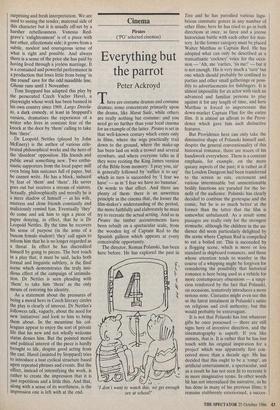Theatre
Ghosts (Young Vic) Largo Desolato (New Vic, Bristol)
Plays of conscience
Christopher Edwards
There is a fine production of Ghosts at the Young Vic. In part Ghosts is a tragedy of sacrifice. The instinctive roots of Ibsen's characters, the 'joy of life', are crushed by their submission to a false and mean ideal — in this case respectability and conven- tion. And the embodiment of that ideal is the prim and hypocritical Pastor Manders (Tom Wilkinson). The central conflict in the play takes place between him and Mrs Alving (Vanessa Redgrave). In fact it is the revolution in her spirit — her rejection of the false gods of respectability — that represents the classic Ibsenite protest of individual freedom: 'I almost believe we are all ghosts, Pastor Manders . . . and then we are all of us so wretchedly afraid of the light'. Here and elsewhere in Ghosts we hear the song of liberal enlightenment sung by Ibsen the social reformer, by Ibsen the dramatist of Protestant conscience.
The essential themes are common to much of Ibsen's work but the pressure of the past is particularly acute in Ghosts — more acute and more successful, dramati- cally, than in, say, Brand. Mrs Alving's son Osvald has inherited syphilis from his dissolute father. This local instance of inherited debt is the mechanism for the play's tragedy but it grows into an envelop- ing impression of the burden of the past. As the drama unfolds — it is very tightly crafted by Ibsen — the characters are revealed to be under the grip of a past that crushes life and opportunity from the present. With each apparent move towards happiness — Mrs Alving's reconciliation with her son, her son's love for Regina — the past releases some other secret from its locker and knocks the hope stone dead. It is an intensely dark but compelling drama, rich with irony, vital moral interest and a sense of the absurd.
The whole cast is first rate. Tom Wilkin- son's Pastor Manders is an excellent speci- me'n of the arch-hypocrite — cold and inhuman in his demands on others and all too human when it comes to protecting his own reputation after the orphanage burns down through his negligence. Vanessa Redgrave's performance is particularly fine and, as so often with this actress, a surprising and fresh interpretation. We are used to seeing the tender, maternal side of this character but it is usually off-set by a harsher rebelliousness. Vanessa Red- grave's 'enlightenment' is of a piece with her other, affectionate side; it grows from a subtle, modest and courageous sense of what is right and possible. And always there is a sense of the price she has paid by having lived through a joyless marriage. It is a contained and powerful performance in a production that loses little from being 'in the round' save for the odd inaudible line. Ghosts runs until 1 November.
Tom Stoppard has adapted this play by the persecuted Czech Vaclav Havel, a playwright whose work has been banned in his own country since 1969. Largo Desola- to, a dark comedy, at least in Stoppard's version, dramatises the experience of a writer who lives in constant fear of the knock at the door by 'them' calling to take him 'there'.
Dr Leopold Nettles (played by John McEnery) is the author of various cele- brated philosophical works and the hero of the 'dissident' opposition. His friends and public await something new. Two enthu- siastic supporters from the local paper mill even bring him suitcases full of paper, but he cannot write. He has a block, induced by fear of 'them' and 'there'. He never goes out but receives a stream of visitors. Sexually, philosophically and morally he is a mere shadow of himself — as his wife, mistress and close friends constantly and maliciously remind him. Eventually 'they' do come and ask him to sign a piece of paper denying, in effect, that he is Dr Leopold Nettles. By the time he recovers his sense of purpose (in the arms of a buxom female student) 'they' call again to inform him that he is no longer regarded as a threat. In effect he has discredited himself by going to pieces. The best touch in a play that, it must be said, lacks both formal and linguistic subtlety, is the final scene which demonstrates the truly insi- dious effect of the campaign of intimida- tion. Dr. Nettles is seen pleading with 'them' to take him 'there' as the only means of restoring his identity.
As a statement about the pressures of being a moral hero in Czech literary circles the play is clearly of interest. Dr Nettles's followers talk, vaguely, about the need for new 'initiatives' and look to him to bring them about. In the meantime his col- leagues appear to enjoy the sort of private life that his new and not wholly welcome status denies him. But the pointed moral and political interest of the piece is hardly brought to life, despite good acting from the cast. Havel (assisted by Stoppard) tries to introduce a taut cyclical structure based Upon repeated phrases and events. But the effect, instead of intensifying the work, is rather to create the impression that it is just repetitious and a little thin. And that, along with a sense of its worthiness, is the impression one is left with at the end.



























































 Previous page
Previous page